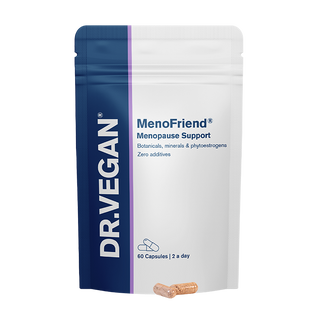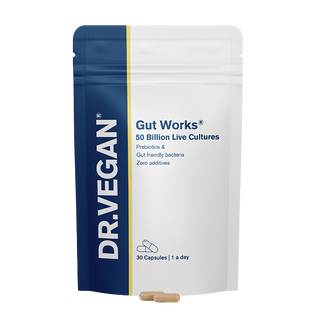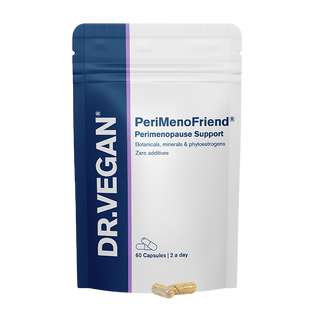5 beneficios de una dieta basada en plantas durante la menopausia

La menopausia es una etapa de la vida que cambia la vida y que, lamentablemente, con demasiada frecuencia va acompañada de cambios físicos y emocionales que afectan la calidad de vida diaria. Ajustar su dieta durante la menopausia es realmente importante para controlar estos cambios y síntomas, y una dieta basada en plantas puede ser particularmente beneficiosa. Si bien es posible que la dieta por sí sola no alivie todos los síntomas, los nutrientes de ciertos alimentos pueden ayudar a abordar muchos síntomas, y los datos muestran que quienes siguen una dieta basada en plantas tienen menos probabilidades de experimentar ciertos síntomas.
Una encuesta de casi 17.000 mujeres que atravesaban la menopausia reveló diferencias en la proporción de mujeres que experimentaban problemas para perder peso, hinchazón, digestión y fatiga, según la dieta que seguían. Entre los que siguen una dieta omnívora, comen de todo:
- El 53 % tuvo problemas para perder peso, en comparación con el 37 % que siguió una dieta basada en plantas;
- El 75% sufría regularmente falta de energía, frente al 63% que seguía una dieta a base de plantas.
Aquí nuestros nutricionistas explican cinco beneficios de una dieta basada en plantas para los síntomas comunes durante la menopausia .
MenoFriend®

Perder peso
Durante la menopausia yla posmenopausia , los cambios hormonales suelen provocar un aumento de peso, especialmente alrededor del abdomen. Una dieta basada en plantas, rica en frutas, verduras, cereales integrales y legumbres , suele tener menos calorías y más fibra . La fibra ayuda a mantener la sensación de saciedad por más tiempo, lo que puede evitar comer en exceso. Además, el énfasis en alimentos integrales y ricos en nutrientes significa que estás alimentando tu cuerpo con lo que necesita sin el exceso de calorías que se encuentran en los alimentos procesados . Evite también los edulcorantes en el té y el café, y los alimentos con edulcorantes como las proteínas en polvo y los batidos sustitutivos de comidas : la Organización Mundial de la Salud confirmó recientemente que no favorecen la pérdida de peso, y cada vez hay más pruebas que vinculan los edulcorantes con cambios en el microbioma intestinal que pueden conducir al aumento de peso.
Descubra una amplia gama de deliciosas recetas a base de plantas en DR.VEGAN® Recipe Hub .
Menos hinchazón y problemas digestivos.
Los síntomas comunes de la menopausia son hinchazón y malestar digestivo . El mayor nivel de fibra en las dietas a base de plantas promueve el crecimiento de bacterias saludables y deposiciones saludables , los cuales ayudan a aliviar la hinchazón y el malestar. Además, aumentar el consumo de alimentos como el jengibre, el hinojo y las verduras de hojas verdes puede ayudar a reducir la hinchazón y calmar el sistema digestivo.
Reducir el consumo de lácteos y carnes rojas, que pueden exacerbar la hinchazón, es otro beneficio adicional. La investigación de una encuesta muestra que el 68% de quienes siguieron una dieta omnívora y comieron de todo durante la menopausia experimentaron hinchazón y problemas de digestión, en comparación con el 53% de quienes siguieron una dieta basada en plantas*.
Gut Works®

Aumento de energía
La fatiga que muchas mujeres sienten durante la menopausia puede estar relacionada con una variedad de factores, que incluyen fluctuaciones hormonales, falta de sueño y una nutrición subóptima. Una dieta basada en plantas proporciona una liberación constante de energía gracias a los carbohidratos complejos que se pueden encontrar en alimentos como el arroz integral, los cereales integrales, la avena, la quinua y las batatas.
El hierro es necesario para obtener energía, pero en ausencia de la menstruación, las necesidades de hierro disminuyen. La ventaja del hierro de origen vegetal es que sólo se absorbe si el cuerpo lo requiere. Esto reduce los riesgos de toxicidad por hierro, que puede ocurrir cuando se consume demasiada carne. Las plantas contienen hierro no hemo , mientras que los productos animales contienen hierro hemo , que se absorbe independientemente de si el cuerpo lo necesita o no.
Quizás te interese leer los 5 mejores carbohidratos para comidas de origen vegetal o las mejores fuentes de proteínas en una dieta de origen vegetal .
Descansa y duerme
Las dietas basadas en plantas contienen un mayor nivel de magnesio . El magnesio es un mineral esencial para el descanso y el sueño, implicado en más de 300 procesos del cuerpo, apoyando el bienestar psicológico hasta la energía, la función muscular y la recuperación. El magnesio se convierte en GABA en el cerebro, lo que ayuda al cuerpo a relajarse y a que la mente esté libre de estrés, lo cual es importante para conciliar el sueño y disfrutar de un sueño más profundo y regenerativo. Quizás también te interese leer '¿Cómo sé si tengo deficiencia de Magnesio?' .
PeriMenoFriend®

equilibrio hormonal
Las dietas basadas en plantas son ricas en isoflavonas, que provienen de alimentos como la soja, las semillas, los frijoles, las nueces y las bayas. El aumento de isoflavonas combate los sofocos y mejora el bienestar general durante la menopausia. Las isoflavonas tienen propiedades estrogénicas suaves y son especialmente ricas en soja, frijol mungo y semillas de sésamo.
¿No estás listo para optar por un producto totalmente vegetal?
La transición a una dieta basada en plantas puede parecer desalentadora. La buena noticia es que puedes hacerlo lentamente. Comience aumentando la cantidad de comidas a base de plantas que tiene y luego aumente la cantidad de días a base de plantas. Puede llevar tiempo experimentar con la comida y descubrir lo que te gusta. Consulta las recetas DR VEGAN® en nuestro sitio web para inspirarte y ¡cuéntanos cuáles te gustan!
Descubra nuestro Centro de Menopausia | R ecursos para ayudar a apoyar a las mujeres durante todas las etapas de la menopausia.
Vea nuestra gama de probióticos, vitaminas y suplementos galardonados .
* Datos de una encuesta de 16,910 mujeres recopilados durante 18 meses hasta el 31 de diciembre de 2024. No influenciados ni verificados de forma independiente por terceros.
Quizás te interese leer:
- ¿Está la menopausia sobremedicalizada?
- Los mejores cambios en la dieta durante la menopausia
- ¿El alcohol afecta la menopausia?
- Por qué la menopausia causa estrés y cambios de humor
- Errores que se deben evitar en una dieta basada en plantas
Referencias:

















